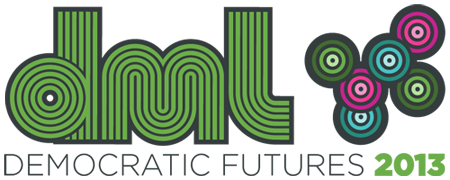WC: Engineering Change: When Digital Remakes Everything and Nothing at All
Young people are using digital media in new ways to express voice and influence in the public sphere. Their “flashes” of activism, spreadable videos, big data experiments, and other efforts are reconfiguring the dynamics of today’s civic life.
Too often, though, when we look at media-based civic organizations, we freeze them in time. To stay relevant, these organizations pivot, sometimes radically, from founding activities to new practices and outcomes. This panel discussion focuses on change inspired by digital media and delves into: conditions that force a major shift, mechanisms for effective transformation, and challenges for learning and civics.
Panelists are youth and adult founding members of three nationally recognized media projects in high-stakes change. Rather than isolate one discussant, all panelists address resonant themes, and Lissa Soep (Youth & Participatory Politics Research Network) will highlight implications for DML research and theory.
1. Youth Radio, founded in 1992, is best known for youth-generated public media stories. The Peabody Award-winning newsroom is NPR’s youth desk and files for outlets including NationalGeographic, HuffPost, and Good. The change: Though “content is king” in the program's newsroom, two years ago, Youth Radio started making mobile apps for social good. The organization is now in the platforms business and this year added coding to its core curriculum.
2. Youth Speaks, in its 17th year, is the nation’s leading producer of teen spoken word poetry. It leads a network of organizations in 70 cities that gather annually at the Brave New Voices Festival, the biggest youth poetry slam in the country, televised on HBO. The change: Rooted in live performance, Youth Speaks is launching its first major digital project this year. “I Live Here,” is a video-based mapping site that invites youth nationwide to share poetry on environmental themes.
3. The Hidden Genius Project is in its first year. Nine young professionals of color launched THGP as a summer program aimed to build critical thinking and unlock careers paths for Oakland black male teens leading to jobs in engineering, design, and entrepreneurship. The change: The founders are developing THGP as a year-round program that could multiply across cities. Adult staff members have worked as execs at some of the nation’s hottest tech companies, and now they’re becoming youth development mentors engaging teens as active participants in their varied communities.
Discussion centers on four questions:
- How does an organization selectively apply lessons from prior work to new technology and learning dynamics, enduring through cycles of change?
- How do adults and young people form new networks for expertise, opportunity, and user engagement?
- What new metrics are needed for projects accustomed to major success in one realm, as they launch efforts that don’t go as planned?What are the features across learning environments that effectively use digital media and tech to build civic participation along the social and economic margins?
Panelists are: 1. Elisabeth Soep PhD, Youth Radio 2. Asha Richardson, Youth Radio’s Mobile Action Lab 3. James Kass, Youth Speaks 4. Jason Young, The Hidden Genius Project.
Organizer(s):
Elisabeth Soep
Participants:
Elisabeth Soep
Asha Richardson
James Kass
Jason Young



